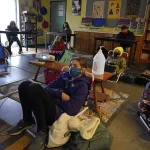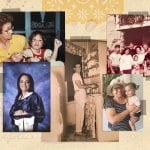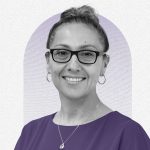For Women’s History Month, we’re letting women tell their stories in their own words through thoughtful conversations. Subscribe to our daily newsletter.
When Odilia Romero immigrated to Los Angeles from Oaxaca, Mexico, as a 10-year-old in the 1980s, she faced a significant language barrier. She was presumed to be a Spanish speaker because she came from Latin America, but she knew neither that language nor English. Fluent in the Indigenous language of Zapotec, Romero struggled to find resources in her mother tongue and encountered prejudice from classmates who derisively called her indio, or Indian.
Culturally isolated, she dropped out of school in about the 10th grade. The language barrier made it “impossible to catch up,” she said.
To instill cultural pride in other Indigenous Angelenos and prevent them from enduring the experiences that she did, Romero and her daughter, Janet Martinez, launched a nonprofit organization in 2016 called Comunidades Indígenas en liderazgo (CIELO) — which in English translates to “Indigenous communities in leadership.” In Spanish, the word “cielo” means “sky” or “heaven.” CIELO works to address the social, economic and cultural challenges of Indigenous communities, celebrate Indigenous languages and end racism against Indigenous people.
For CIELO’s efforts, Romero was one of 17 women activists to whom Lizzo dedicated her People’s Choice Award in December. Just the month before, CIELO was among the honorees the Mexican American Legal Defense and Educational Fund recognized at its Los Angeles Annual Awards Gala.
One of CIELO’s main goals is simply to get society to recognize that Indigenous people exist throughout the Americas. Since the U.S. Census does not record the native languages of Latin American immigrants, it isn’t clear how many Indigenous speakers live in Los Angeles or in the United States. However, in 2011, Census data revealed that more than a million Hispanics nationally identified as “American Indian,” up from 400,000 in 2000.
More recently, researchers have estimated that up to 200,000 Zapotec people alone reside in L.A. County. Other Oaxacan-origin languages spoken in the region include Chinantec, Mixtec and Triqui, while Indigenous Angelenos from Guatemala speak Mayan languages such as K’iche’ and Mam. In 2020, a study of more than 1,000 California farmworkers, nearly all born in Latin America, found that 10 percent of them primarily spoke an Indigenous language at home.
That study coincided with the onset of the COVID-19 pandemic and with CIELO’s efforts to provide financial relief to undocumented Indigenous people hard hit by the crisis. The organization has raised more than $2 million in COVID relief funds.
The organization’s work also extends to the school-age population throughout L.A. County, where Indigenous students and their families often go unrecognized and without the language and cultural resources needed for them to thrive. CIELO provides interpretation for families and offers outreach to Indigenous youth. Their work has taken on urgency following a Los Angeles City Council scandal last year in which the body’s first Latina president, also a former school board member, was recorded making disparaging remarks about Indigenous Oaxacans, a Black child, a gay councilman and others.
The 19th spoke with Romero and Martinez about their efforts to advocate for Indigenous families in Los Angeles-area schools, how their personal experiences have informed their work and whether the L.A. City Council controversy will lead to change.
This interview has been edited for length and clarity.
Nadra Nittle: You attended Los Angeles public schools and now advocate for Indigenous families who do. What was your experience like as a student?
Odilia Romero: This was 42 years ago that I went through the LAUSD. It was during the Guatemalan Civil War and also during a huge displacement of Indigenous people from Oaxaca. And, at that time, nobody knew that we spoke another language. We kept on passing grades without anybody noticing. We weren’t responding in Spanish, so we were sent to all-English classes.
We’re not thought about as Indigenous people from south of the imposed border. My story, and the ones of my community members, has not changed. If anything, there’s more knowledge about us, but when we’re spoken about, it’s in a derogatory way. Back in the day, I was called an Indian, but I didn’t know what it meant, so it really didn’t bother me. But now people know Indian as a derogatory term. And, of course, this is the cause of bullying. We saw it with the L.A. City Council scandal. That doesn’t change in schools, and we know there’s Indigenous kids there, because CIELO has an interpreting department, the Center for Indigenous Language and Power, and we get calls from a company that they hire that then subcontracts with us because they can’t provide the interpreters.
-
More Women’s History Month conversations
- U.S. ambassador to the United Nations shares what she sees on gender equity
- New museum on American women’s history is about more than documenting ‘the firsts’
- ‘Moving unapologetically to the forefront’: How an archive is preserving the Black feminist movement
I want to return to your personal experience for a moment. You didn’t know English or Spanish but were put into English-only classes. What was your education like?
Romero: I have no education, because I didn’t understand Spanish or English. To this day, I have difficulty reading. Thank God for Speechify and audiobooks. And when I tried to go to college, because I wanted to go to business school, I couldn’t because I didn’t understand the math. So it has a consequence in your life forever. The fact that these kids are not being attended to and people don’t know how to support them, it’s a thing that they’re going to carry throughout their lives. My experience was terrible.
I think today they know a little better, but they’re not making as big of an effort as they could be because the people that lead these institutions are racist, and they have a prejudice against Indigenous people just like the city council officials.
You did not graduate from high school due to the language barrier. What did you do after quitting school?
Romero: I got married, had a child and stayed home for a few years. Then, I worked at a domestic violence shelter, and then I worked in the garment industry. Eventually, I made it as a bank teller and started working in banking, but that’s because I took a small class in banking back in the day. If I wouldn’t have taken that class, I think I would have stayed as a homemaker or in the garment industry.
What led you to start CIELO?
Janet Martinez: I don’t speak Zapotec, because both my parents felt profoundly the effects of speaking a language that wasn’t the predominant language and the effects of not having services in their language. They felt that English had to be first and Zapotec was to be forgotten because it was just something that really proved difficult for them to be able to pass on due to all the systemic barriers that they faced. And so CIELO comes out of the idea of building spaces for languages to thrive, for Indigenous languages to be celebrated and for them to be revitalized.
We have Indigenous language workshops and we have our interpretation department, and all of them kind of feed one into the other about the different ways that language can be used in a positive way instead of the ways that they had experienced it in the school system. And I feel like that’s really been a lot of the impulse of the work that we do at CIELO to provide services to people that speak Indigenous languages and to also prioritize those communities that systematically have been underserved. So I feel like for us, CIELO comes from a response to really ignoring those populations and not having anything geared towards them — not within the city, not within the school systems.
One way you think schools can do a better job with their Indigenous outreach is by identifying that these students exist. Can you elaborate on that?
Romero: One of the things about us as Indigenous people is that we’re wrongly called Latinos, right? There is an assumption that everybody that comes from south of the imposed border speaks Spanish, and with that assumption, everybody is put in this label of Latino and they don’t ask if you are of Indigenous descent. They don’t ask if you speak another language. Usually, the kids that don’t understand the language get labeled as unwilling to do their homework or to participate. And they often get reprimanded for not participating. But nobody asks if maybe they’re not understanding, and I think what they could do differently is begin to think that in every city in L.A. County, there’s Indigenous people. The other day someone told me that they only have 500 Indigenous students in their district, and I said, “No, please don’t say that you have 500 people in your district because you have thousands of Indigenous people.”
Martinez: Districts need to know who the communities are that they’re serving. That they don’t have a real count of the Indigenous populations that they’re serving in their school districts is a problem, right? If you don’t know who you serve, how will you ever be able to respond to the needs that that brings up?
Do you think it would be helpful for districts to have Indigenous speakers on staff?
Romero: It would be helpful, but in order to make a political statement, you have to be really proud of who you are and where you come from. What we’ve noticed is there are a lot of Indigenous people in these institutions, but because there’s this stigma of being Oaxacan, of being Indigenous, nobody wants to come out and advocate for these kids. The racism and discrimination that comes from the other Latinos makes Indigenous people that are in these institutions afraid to come out as Indigenous people. They’re afraid of being singled out. There’s a lot of people that were born here that work in these institutions that we want to empower to be proud and say, “Hey, I’m going to push the envelope a little to advocate for this child that I know for a fact that doesn’t speak Spanish.” But a lot of that is not happening in any of these institutions.
CIELO has done some partnerships and outreach at some L.A.-area schools. Can you describe that work?
Martinez: We’re currently discussing being part of the language revitalization efforts at one school. We also have partnered with schools at our Indigenous Interpreters Conference. We invited the students to come to the conference to learn that there’s a viable career path if they retain their language because what we are seeing is that, in many cases, people want to forget the Indigenous languages that they speak. So I think that this is one of the ways that we’re able to incentivize people to understand that their language is valuable and also that the language can open career paths that otherwise wouldn’t be there if you didn’t speak the language. We also have invited students to our events that we host like book presentations.
The L.A. City Council scandal and the subsequent protests drew attention to the fact that Los Angeles is home to a large Indigenous population. Do you think the attention will lead schools and other government entities to acknowledge the existence of this population and their priorities?
Romero: I think the scandal was a very clear example of how they talk about us behind closed doors — politicians, administrators, city council leaders, school board members. This is a reflection of how Indigenous people are viewed in general. The schools have had Indigenous people for at least the last 50 years, and they haven’t made an effort. They know that we exist. They choose not to make the effort to address the language barriers that we have.






